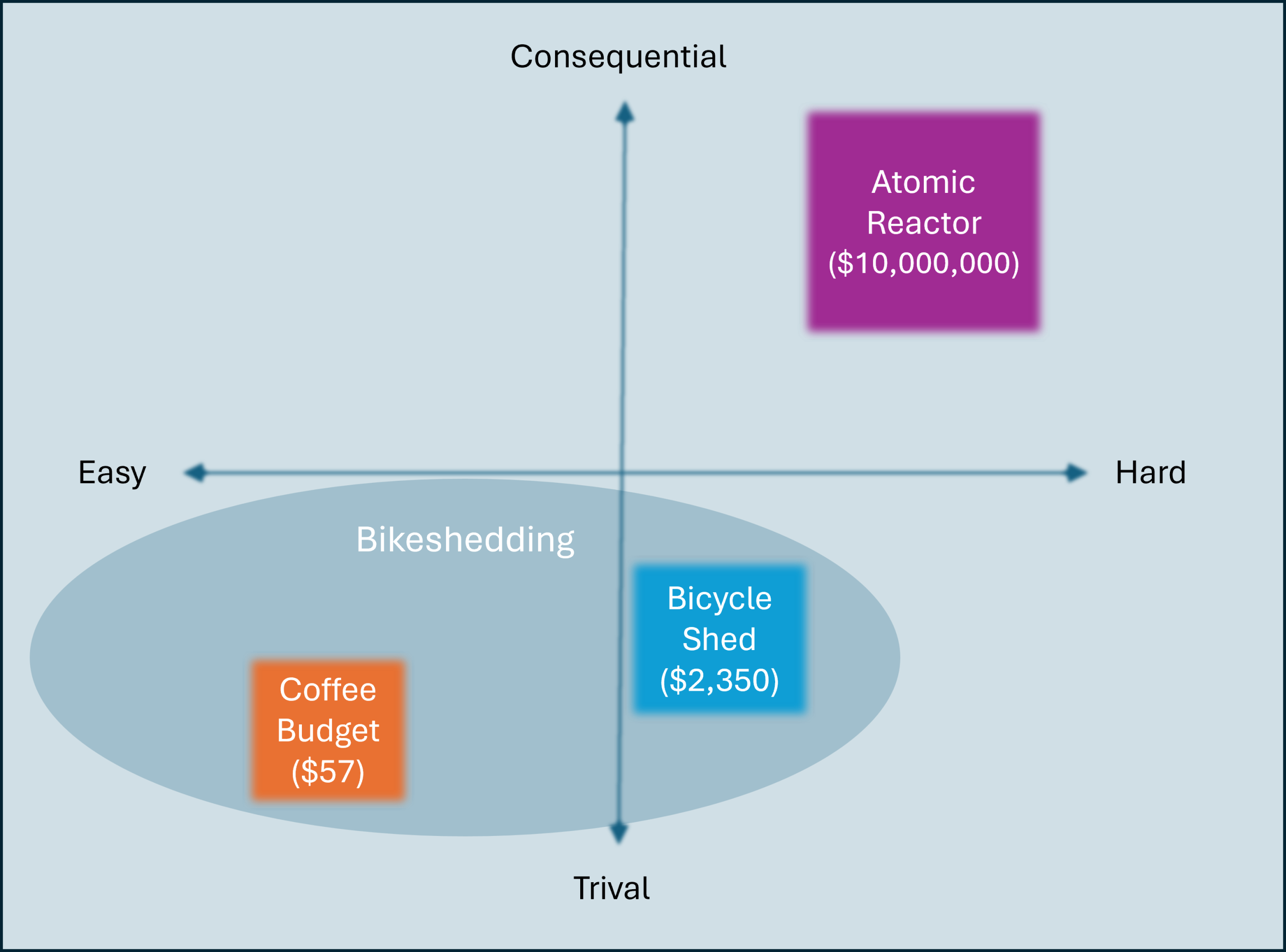Over the course of my healthcare career, I’ve spent countless days and long nights managing Electronic Health Record (EHR) cutover events. This process involves moving patients, their data, and supporting technologies from one EHR system to another. Therefore, the planning requires detailed project plans, meticulous timelines, and hours of meetings with subject matter experts, analysts, and clinical informatics. These meetings, at best, can charitably be called painful.
The Bikeshed Effect
During most meetings I would struggle to get the needed details. While trying to tackle critical process questions I’d be lucky if anyone spoke up. But then something odd would happen: we’d begin to discuss simpler topics such as command center logistics. Suddenly everyone has an opinion! What should the dress code be? How much should we put on the meal vouchers we give out? Where should staff park?
These trivial decisions regarding the command center had limited bearing on the success of the event, yet we could spend an entire meeting debating these types of topics. Meanwhile, more important matters, like laying out how we’d reconcile patient room and bed charges so the hospital didn’t lose money – got pushed off.
It wasn’t until later that I learned this phenomenon had a name: Law of Triviality, coined by Cyril Northcote Parkinson in his 1957 book “Parkinson’s Law, and Other Studies in Administration.” From an example illustrating this tendency for people to spend a disproportionate amount of time on trivial issues while neglecting more important, complex matters a catchier name emerged: Bikeshedding.
What is Bikeshedding?
Bikeshedding refers to the investment of time and energy into marginal tasks at the expense of far more serious problems or issues. I’m sure everyone reading this article has fallen into this trap many times. I know I’m guilty of it too.
In his book, Parkinson references a meeting with three agenda items:
- The construction of an atomic reactor for $10,000,000
- The construction of a bicycle shed for $2,350
- The annual coffee budget of $57 for a recurring meeting
What item do you think took up most of the committee’s time?
If you’ve been in any meetings with an agenda like this, you know the answer. The construction of the reactor had less than three minutes of discussion with no objections – it was too complicated for the group to want to handle. The bicycle shed sparked 45 minutes of debate over roofing materials and construction costs that would save less than $300. And the coffee budget? That took the remainder of the meeting and generated the most discussion.
Objectively, the coffee budget is not that important to running the business, it has the least financial and operational impact. However, it created the greatest discussion because the committee subjectively found it the most relatable (and therefore important). The bottom line: people feel more comfortable prioritizing things they understand, and coffee budgets are easy to associate with.

The Impact of Bikeshedding
When Bikeshedding is experienced at the micro level, projects can suffer immensely. As I alluded to at the beginning of this article, when doing project planning, the team will spend a lot of time discussing what to name the project, what color t-shirts to wear at go-live, or how much coffee to stock in the command room (the answer is always a lot), while giving less importance the bigger decisions of staff coverage, patient transport, or billing implications.
At the macro level, Bikeshedding can be seen every time a team endlessly debates what software to use, but not the process behind why it’s needed or how it will be used. If a new Project Management System is up for debate, there will be endless discussion about software, but failure to address how projects need to be tracked, how resource capacity should be managed, or how governance must engage. This happens because Bikeshedding tells us that debating software applications feels productive, but it hides the harder work of establishing accountability and collaborative processes. These examples illustrate how Bikeshedding often masquerades as productive work but ultimately leads to wasted time and unresolved larger core issues.
If your organization struggles with this, MAKE has a series of Operational Excellence workshops that can help.
Why does Bikeshedding happen?
There are lots of reasons Bikeshedding occurs, but the four most common ones are:
- Fear of appearing uninformed (Reliance on an expert): No one wants to look dumb, so we stay quiet and hope someone else has expertise and will step in, so we don’t have to. In the Parkinson example, if you had to approve the atomic reactor budget, would you even know where to start with the right questions? The saying “better to remain silent and be thought a fool than to open your mouth and remove all doubt” fits in well here.
- Taking the easy route: The hard stuff is…hard. It requires energy and deep thinking to comprehend, process, and solve. These hard problems aren’t something people want to work through at the end of an hour-long meeting late in the week. It’s too mentally draining, they don’t know the subject material, or they feel inadequate compared to the experts, so they focus on the other stuff where they can minimize those concerns.
- Dopamine hits: Simply put, checking off small tasks feels good. And what better way to get that rush of satisfaction than by getting something done, even if is an easy task? Those harder items take much longer to work through and checking them off isn’t going to come as quickly, robbing you of that feeling of accomplishment.
- One of the gang: When the group hits on a topic everyone understands, participation surges. Picture this: You’re in a meeting and the agenda topic is something you’re not familiar with or an expert on. You don’t know the right questions to ask so you stay silent during the discussion. That internal voice is nagging you, wondering if you’re pulling your weight in the meeting or if someone will notice your lack of participation. Instead, when the meeting moves on to the topic of snacks for the company party, well now you are ready to speak up! And everyone else who was silent does too! These topics have common understanding that everyone is familiar with, and now it’s a social event.
The Key to Combatting Bikeshedding
To overcome Bikeshedding we first need to understand that it’s not about never doing the easy tasks or making the easy decisions. Instead, it’s about knowing the order to do them in and the consequences of the order.
Here are five tips to combat Bikeshedding:

- Acknowledge it. Talk with your team about Bikeshedding – help them understand what it is and how identify signs its occurring so they can course correct. I’ve started doing this in some of my meetings and others are starting to catch on to it as well. When we call it out, we laugh, reset, and move on. This can help keep your meetings and topics on task.
- Break out the hard stuff. If you have a tough topic or something that’s going to require concentrated discussion, schedule a separate, focused meeting for it. Then it becomes clear if the conversation gets off track. This also ties into the next tip, which is to:
- Limit participants. If people aren’t speaking up because they think an expert will be the one to chime in, then lean into that and have a meeting with just the experts and remove the people who might lead to Bikeshedding.
- Tackle hard stuff first. This may be the hardest of them all. Everyone has a mental battery that drains through the day. While it’s tempting to put the easy stuff at the beginning to get it done with, all you’re doing is using up mental capacity. Instead, strategically plan the hardest questions, projects, or tasks first so you don’t burn yourself (and the team) out.
- Provide details in advance. People tend to not speak up on topics they’re not familiar with, so provide background information or materials ahead of meetings so they have a chance to study and inform themselves on an opinion.
Bikeshedding is a fun term to describe something we all do – at work, in meetings, with our teams, and even in our personal lives. Understanding and recognizing when it happens can help us ask “is this really the problem we need to solve?”, and ensuring we are using our time and resources more effectively.
How MAKE Solutions Can Help
At MAKE we understand how important effective and efficient meetings are for successfully delivering IT projects. Our operational excellence consultants have been in your shoes and have decades of experience navigating these challenges. MAKE’s services and software equip teams with the tools and insights needed to navigate the complexities of project management.
For more information, visit our website at: makesolutionsinc.com
References and Recommended Reading
- The Decision Lab. Why do we focus on trivial things? https://thedecisionlab.com/biases/bikeshedding
- Effectiviology. Bikeshedding and the Law of Triviality: Why People Focus on Minor Issues. https://effectiviology.com/bikeshedding-law-of-triviality
- Simplicable. 7 Examples of Bikeshedding. https://simplicable.com/new/bikeshedding
- Parkinson's Law. Parkinson, C. Northcote. https://archive.org/details/parkinsonslawoth00park
Talk to Our Experts
You don't have to try to figure this out on your own. Get the help you need to ensure better outcomes and be confident in your testing approach.
